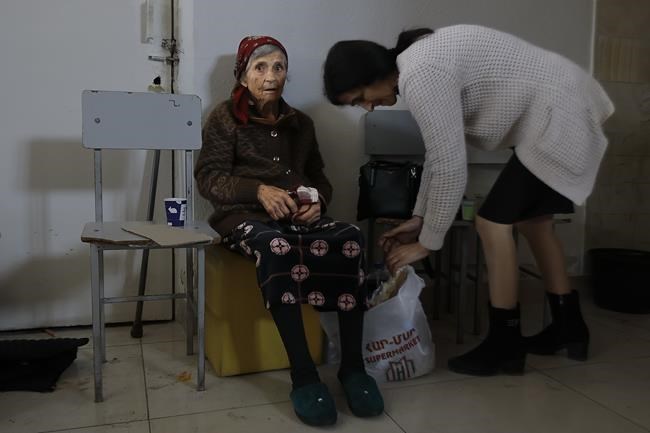
An ethnic Armenian woman from Nagorno-Karabakh waits to receive humanitarian aid at a temporary camp in Armenia's Goris in Syunik region, Armenia, on Tuesday, Sept. 26, 2023. Thousands of Armenians have streamed out of Nagorno-Karabakh after the Azerbaijani military reclaimed full control of the breakaway region last week. (AP Photo/Vasily Krestyaninov)
Republished September 26, 2023 - 1:59 PM
Original Publication Date September 26, 2023 - 12:26 AM
YEREVAN, Armenia (AP) — An explosion at a crowded gas station in Azerbaijan's Nagorno-Karabakh region left scores of people dead and injured as thousands of ethnic Armenians rushed to flee into neighboring Armenia, the separatist territory's authorities said Tuesday.
Some 28,000 people — about 23% of the region's population — have fled across the border since Azerbaijan defeated separatists who have governed the breakaway region for about 30 years in a swift military operation last week, according to Armenia's government.
Residents of Nagorno-Karabakh scrambled to flee as soon as Azerbaijan lifted a 10-month blockade on the region's only road to Armenia. That blockade had caused severe shortages of food, medicine and fuel. While Azerbaijan has pledged to respect the rights of Armenians, many residents feared reprisals.
“I think we’re going to see the vast majority of people in Karabakh leaving for Armenia,” said Thomas de Waal, a senior fellow at the Carnegie Europe think tank. “They are being told to integrate into Azerbaijan, a country that they’ve never been part of, and most of them don’t even speak the language and are being told to dismantle their local institutions. That’s an offer that most people in Karabakh will not accept."
The explosion took place as people lined up to fill their cars at a gas station outside Stepanakert, the region's capital, late Monday. The separatist government's human rights ombudsman Gegham Stepanyan said Tuesday evening that 68 people have died, another 290 were injured and 105 are still considered missing.
According to Stepanyan, 21 bodies have been identified. A total of 168 of those injured were admitted into hospitals in Armenia in ambulances and helicopters.
The cause of the blast remains unclear, but Nagorno-Karabakh presidential aide David Babayan said initial information suggested that it resulted from negligence, adding that sabotage was unlikely.
Armenian authorities also said that they brought 125 bodies over to Armenia from Nagorno-Karabakh for identification. The country's Health Ministry clarified that all of those were killed in the fighting last week.
Azerbaijani presidential aide Hikmet Hajiyev said on X, formerly Twitter, that hospitals in Azerbaijan were ready to treat victims, but did not say if any had been taken there. Azerbaijan has sent in burn-treatment medicine and other humanitarian aid, he said.
Azerbaijan also said Tuesday that 30 metric tons (33 U.S. tons) of gasoline and 34 metric tons (37 U.S. tons) of diesel fuel were being sent into the region.
U.S. National Security Council spokesperson Adrienne Watson said in a statement that the U.S. urged humanitarian access to Nagorno-Karabakh. "The United States will continue to support those affected by the ongoing crisis as 28,000 people have crossed into Armenia from Nagorno-Karabakh,” she said.
Watson said the U.S. would provide additional assistance to help local communities “provide shelter and essential supplies — such as hygiene kits, blankets, and clothing — to address the needs of those affected or displaced by violence in Nagorno-Karabakh."
The Azerbaijani military routed Armenian forces in a 24-hour blitz last week, forcing the separatist authorities to agree to lay down weapons and start talks on Nagorno-Karabakh’s “reintegration” into Azerbaijan.
Gasoline has been in short supply in Stepanakert for months, and the explosion further added to the shortages, compounding anxiety among many residents about whether they will be able drive the 35 kilometers (22 miles) to the border.
Cars bearing large loads on their roofs crowded the streets of Stepanakert, and residents stood or lay along sidewalks next to heaps of luggage.
Nagorno-Karabakh authorities asked residents to hold off on leaving in order to keep the road clear for emergency services and said buses would be provided for those who want to leave.
Nagorno-Karabakh was an autonomous region within Azerbaijan under the Soviet Union. Separatist sentiment grew in the USSR's dying years and then flared into war. Nagorno-Karabakh came under the control of ethnic Armenian forces, backed by the Armenian military, after a six-year separatist war that ended in 1994.
In another war in 2020, Azerbaijan took parts of Nagorno-Karabakh and completely reclaimed surrounding territory that it lost earlier. Under the armistice that ended the 2020 fighting, Russia deployed a peacekeeping force of about 2,000 to the region. Russia's influence in the region has waned amid its war in Ukraine, emboldening Azerbaijan and its main ally, Turkey.
Armenia's Prime Minister Nikol Pashinyan has blamed Moscow, the country's main ally, of failing to prevent the hostilities, accusations the Kremlin has angrily rejected. The Russian Foreign Ministry retorted, denouncing Pashinyan's statement as an “attempt to shift responsibility for failures in domestic and foreign policies onto Moscow” and part of efforts to take Armenia out of Russia's orbit in favor of forging stronger ties with the West.
“The Armenian leadership is making a huge mistake by deliberately attempting to sever Armenia’s multifaceted and centuries-old ties with Russia, making the country a hostage to Western geopolitical games,” the ministry said in Monday's statement.
It denied allegations that Moscow was fomenting the protests in Yerevan calling for Pashinyan's ouster.
De Waal predicted that political infighting in Armenia would increase.
“We’re going to see unstable days in Armenia with various forces trying to get rid of Pashinyan and others on the contrary trying to defend him because they fear some kind of Russian-backed attempt to get rid of him,” he said.
___
Associated Press writers Aida Sultanova and Emma Burrows in London, Jim Heintz in Tallinn, Estonia, and Nancy Benac in Washington contributed to this report.
News from © The Associated Press, 2023